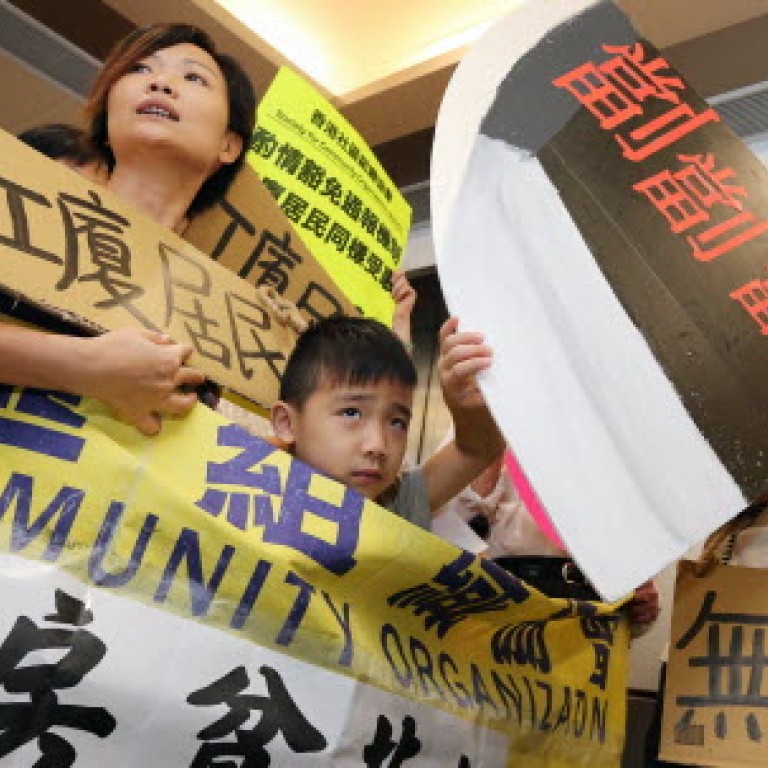
Housing subsidy U-turn shows up government inconsistency
Albert Cheng says instead of tying themselves in knots to justify it, officials should look to redevelop subdivided industrial buildings
In July, the Commission on Poverty approved extending handouts to inadequately housed residents through the Community Care Fund. Benefactors include those who live in subdivided private flats, squatter huts, and the homeless. The government said money would not go to those in subdivided industrial buildings.
Then, after pressure groups and residents in subdivided industrial units protested, the government changed its mind and included them as well. In total, an estimated 78,700 families, or 210,000 people, will benefit.
The benefactors are mainly those who receive no public housing subsidies or welfare benefits. To extend a one-off handout to them is more than reasonable and also fits the purpose of the Community Care Fund.
Handing out allowances shows a blatant disregard of the law and for tenants’ safety
But extending it to tenants of illegally subdivided industrial buildings has created another problem. As the government forbids the use of industrial buildings for residential purposes, handing out allowances would be tantamount to the government breaking the law. It would render the law ineffective.
On the face of it, the allowance would appear to be a subsidy to these illegally subdivided industrial building units. This might encourage more owners of industrial buildings to subdivide their properties to feed market demand in order to reap profits. It would worsen the problem of illegally converted units in industrial buildings, which can be a fire hazard.
The Commission on Poverty, headed by Chief Secretary Carrie Lam Cheng Yuet-ngor, has refused to reconsider the implications of extending the allowance to these illegal tenants.
And Dr Law Chi-kwong, chairman of the executive committee of the Community Care Fund, who is in charge of the project, came up with some twisted logic to defend the government's stance. He said legal advice specified that tenants of these subdivided units could not be said to have broken the law until the owner of the unit had been notified of its illegal status. With this logic, he insisted that the government is certainly not encouraging illegal activities.
Furthermore, he said that even if these units were found to be illegal, the onus would be on owners alone, not the tenants. Hence, handing out allowances would not be affected.
He stressed it would be difficult to ascertain whether applicants were living in illegal units and thus the government would not proactively report and investigate applicants.
This kind of logic is ludicrous.
The government has insisted on zero tolerance for illegally subdivided industrial units because they don't comply with fire safety regulations and thus pose a serious danger to tenants. So handing out allowances shows a blatant disregard for the law and for tenants' safety.
The decision has instantly fuelled the supply of these illegal units and pushed up their rents. According to some press reports, the rents of some of the cheapest subdivided industrial units in Tuen Mun rose within days of the announcement, from below HK$2,000 per month to more than HK$3,000 in some instances.
It seems that the Commission on Poverty's policy is encouraging more of these property owners to go down this unlawful path. No matter how you look at it, the commission is certainly "legalising" these subdivided industrial units.
It's worth remembering that right after the Ma Tau Wai building collapse tragedy in 2010, Lam, who was development secretary at the time, vowed to rid Hong Kong of all illegal building structures. It was all a show to demonstrate her toughness.
Now the Long Term Housing Strategy Steering Committee has proposed a licensing system to regulate subdivided units. This would have the effect of indirectly endorsing these units.
It goes to show that the Leung Chun-ying administration has no idea how to resolve the issue, despite its pledges. It appears to be accepting the reality that subdivided units are here to stay.
It seems rather contradictory: the government has taken a stance against illegal subdivided industrial building units, but, at the same time, the Commission on Poverty is, in a way, subsidising their existence. What kind of logic is that? It has confused both the public and the relevant departments.
Again, it confirms that our politically accountable officials never practise what they preach. If this mentality is allowed to continue, we can kiss goodbye to the policy of "Hong Kong people ruling Hong Kong".
In order to resolve the issue of housing for the grass roots, we could revitalise our industrial buildings and turn them into proper public housing units. This would kill two birds with one stone - provide a large number of affordable public units for the needy while getting rid of illegal subdivided units in a short period of time. Why not?

